Diarrhea is a common and distressing issue for our canine companions, frequently leading dog owners to seek veterinary care. While some mild cases may resolve with at-home care, understanding when and why a dog anti-diarrhea medication prescription is necessary is crucial for your pet’s health. This article, from the experts at Dog Care Story, delves into the importance of addressing canine diarrhea, explores various types of medications, and highlights the specific instances where a veterinarian-prescribed solution becomes essential. Our goal is to equip you with high-quality, actionable insights to ensure your dog receives the best possible care for this uncomfortable digestive condition.
The Critical Importance of Addressing Dog Diarrhea
Diarrhea in dogs is more than just an inconvenience; it’s a symptom indicating an underlying problem within the digestive system. When your dog experiences diarrhea, food passes too quickly through their gastrointestinal tract, hindering the proper absorption of water, vital nutrients, and electrolytes. This results in loose, watery stools, often accompanied by a general feeling of malaise. In some cases, you might even observe blood or mucus in your dog’s stool, signaling a more severe issue.
Ignoring persistent or severe diarrhea can lead to serious health consequences, primarily due to extreme fluid loss and dehydration. Puppies, with their less robust bodies, are particularly vulnerable to dehydration, making puppy diarrhea potentially life-threatening. Similarly, senior dogs and those with compromised immune systems face heightened risks. Therefore, providing effective diarrhea relief isn’t just about comfort; it’s about resetting the digestive system, restoring normal function, and safeguarding your dog’s overall well-being.
While at-home remedies like rest, adequate rehydration, and a temporary bland diet might suffice for mild, self-limiting cases, severe or persistent diarrhea often calls for professional intervention and a specific dog anti-diarrhea medication prescription.
When a Dog Anti-Diarrhea Medication Prescription Becomes Necessary
Determining whether your dog needs a veterinarian-prescribed medication for diarrhea hinges on several factors, including the severity, duration, and underlying cause of the condition. A prescription is typically considered when:
- Diarrhea is severe or persistent: If loose stools continue for more than 24-48 hours, or if they are extremely watery, frequent, or explosive.
- Accompanying severe symptoms: Diarrhea coupled with other concerning signs like repeated vomiting (especially if your dog is vomiting and not eating), lethargy, weakness, abdominal pain, fever, or noticeable dehydration.
- Presence of blood or mucus: Any blood (bright red or dark, tarry stools) or excessive mucus in the stool is a red flag requiring immediate veterinary attention.
- Specific pathogens are suspected: If parasitic infections (like Giardia or Coccidia) or bacterial overgrowth are identified or strongly suspected.
- Puppies, seniors, or immunocompromised dogs: These groups are more susceptible to severe complications from diarrhea and often require quicker, more aggressive medical treatment.
In these situations, your veterinarian will conduct a thorough examination and may recommend diagnostic tests to pinpoint the exact cause before providing a tailored treatment plan, which often includes a specific dog anti-diarrhea medication prescription.
Understanding Dog Diarrhea Medication Types

The market offers various options for treating dog diarrhea, ranging from over-the-counter (OTC) solutions to specialized prescription drugs. It’s crucial to understand their differences and, more importantly, when to use each type, always under veterinary guidance.
Over-the-Counter (OTC) Anti-Diarrheal Medicines for Dogs: Use with Extreme Caution
Many human OTC anti-diarrheal medications, such as Imodium (loperamide), Kaopectate, and Pepto-Bismol, are readily available. While these may provide relief for humans, they are generally not recommended for dogs without explicit veterinary approval.
- Imodium (Loperamide): This medication works by slowing down intestinal motility. While veterinarians might use canine Imodium off-label in very specific cases, it carries a risk of serious side effects in certain dog breeds (especially Collies, Shelties, Australian Shepherds, and other herding breeds due to a common MDR1 gene mutation) and can worsen some types of diarrhea by trapping toxins in the gut.
- Kaopectate and Pepto-Bismol: These contain active ingredients like bismuth subsalicylate. While they can coat and protect the intestinal lining, salicylates (aspirin-like compounds) can be toxic to dogs, potentially causing gastrointestinal bleeding or other adverse reactions.
Never administer human OTC anti-diarrheal medications to your dog without consulting your veterinarian first. Self-medicating can mask serious symptoms, delay proper diagnosis, or even cause harm. If your vet does recommend an OTC option, strictly follow their dosage instructions.
Probiotic Supplements: Restoring Gut Balance
A healthy canine gut thrives on a diverse population of beneficial bacteria. Diarrhea often disrupts this delicate balance, depleting these “good” bacteria. Probiotic supplements are designed to reintroduce and boost beneficial gut flora, aiding digestion, strengthening the immune system, and re-establishing a healthy balance that promotes normal stool consistency.
While human probiotics generally won’t harm your dog, species-specific probiotics formulated for canines are a superior choice. They contain strains of bacteria naturally found in a dog’s gut, offering more effective support for their unique digestive system.
Prescription Anti-Diarrheal Medications: Targeted Treatment
When the cause of diarrhea is severe, persistent, or due to a specific pathogen, your veterinarian will likely prescribe a targeted medication. These are often considered the most effective solutions, addressing the root cause of the problem.
- Antibiotics: Prescribed for bacterial infections or bacterial overgrowth. Metronidazole is a common choice.
- Antiparasitics (Dewormers): Used to eliminate intestinal parasites like Giardia, roundworms, hookworms, or whipworms. Fenbendazole (Panacur) is a broad-spectrum dewormer often used.
- Motility Modifiers: Similar to Imodium, these prescription drugs (e.g., diphenoxylate) slow intestinal movement under strict veterinary supervision.
- Adsorbents and Protectants: Medications that bind to toxins and coat the intestinal lining to soothe irritation and aid in stool firming.
- Anti-inflammatories: In cases where diarrhea is due to inflammatory bowel disease (IBD) or severe intestinal inflammation, corticosteroids might be prescribed.
The specific dog anti-diarrhea medication prescription will depend entirely on your vet’s diagnosis.
Top Veterinarian-Recommended Prescription Anti-Diarrhea Medications for Dogs

When at-home remedies aren’t enough or a specific issue is identified, your vet may recommend one of the following prescription or professional-grade anti-diarrheal solutions. These are often considered the best diarrhea medicine for dogs, depending on the cause and severity of symptoms.
Metronidazole (Flagyl)
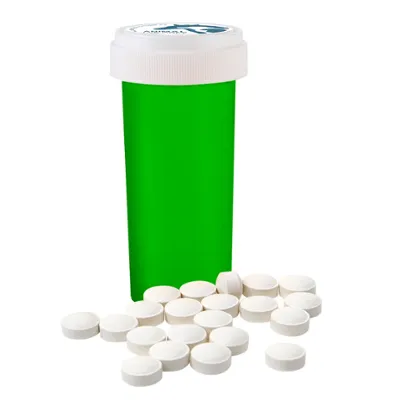
What it is: Metronidazole is a broad-spectrum antibiotic and antiprotozoal agent. This means it’s effective against certain anaerobic bacteria and protozoal parasites (like Giardia) that can cause intestinal inflammation and diarrhea.
How it works: It kills sensitive bacteria and protozoa, helping to resolve infections and reduce inflammation in the gut.
When it’s prescribed: Often used for acute, undiagnosed diarrhea, inflammatory bowel disease (IBD) flares, or giardiasis.
Important considerations: While generally safe, metronidazole can cross the blood-brain barrier at higher doses or with prolonged use, potentially causing neurological symptoms like tremors or seizures. Other side effects can include nausea, decreased appetite, and lethargy. It is crucial to adhere strictly to your veterinarian’s prescribed dosage and duration.
Proviable DC Capsules
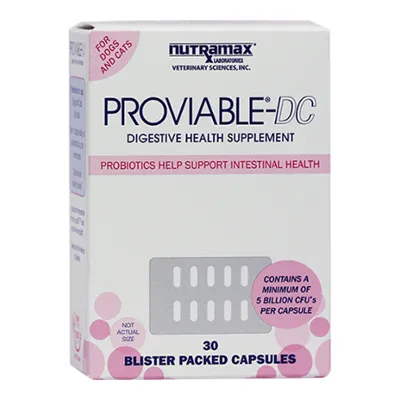
What it is: A highly concentrated probiotic supplement containing seven key strains of beneficial bacteria and prebiotics.
How it works: It helps re-establish and maintain a healthy microbial balance in the gut, which is often disrupted by diarrhea, stress, or antibiotic use. The prebiotics (FOS) nourish the beneficial bacteria.
When it’s prescribed: Often recommended alongside antibiotics, during periods of stress, or for chronic gastrointestinal issues to support gut health and firm stools.
Administration: Typically given once daily by mouth.
Proviable Forte Chewable Tablets
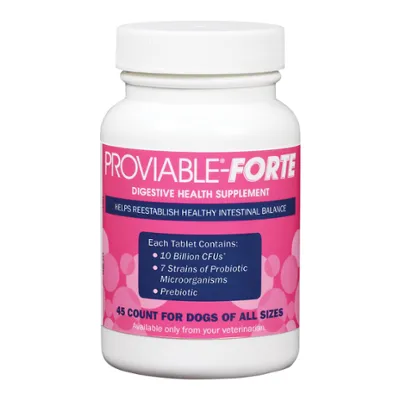
What it is: Similar to Proviable DC capsules, Proviable Forte is another potent probiotic supplement, but in a chewable tablet form, designed for easier administration. It also contains multiple beneficial bacterial strains and prebiotics.
How it works: Aids in restoring healthy gut flora, crucial for proper digestion and immune function.
When it’s prescribed: An excellent option for dogs that prefer chewable tablets, used for similar indications as the capsules, such as during diarrhea recovery or for ongoing gut support.
Administration: Given once daily by mouth.
Rx Clay Powder
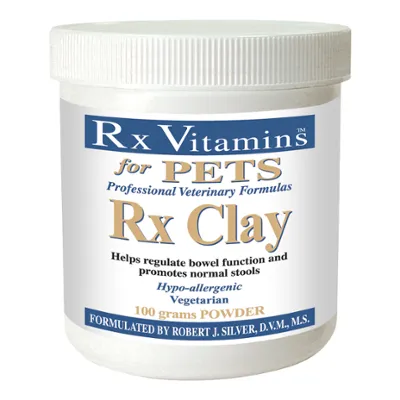
What it is: A professional-grade adsorbent powder.
How it works: Rx Clay contains ingredients that can bind (adsorb) to toxins, bacteria, and excess water in the gastrointestinal tract. By binding to toxins, it helps remove harmful substances from the body. By adsorbing excess water, it aids in firming up loose stools.
When it’s prescribed: Often used for acute, non-specific diarrhea, or as supportive therapy alongside other medications. It can help alleviate symptoms while the underlying cause is being addressed.
Important considerations: Since the body does not absorb the clay, the risk of overdose is minimal. Dosage is typically based on body weight.
Endosorb Tabs
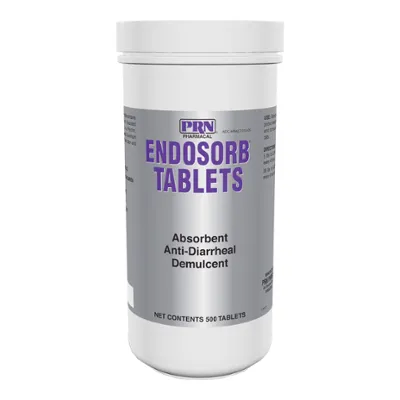
What it is: Chewable tablets primarily containing attapulgite, an adsorbent and protectant.
How it works: Attapulgite works by adsorbing bacterial toxins and coating the intestinal lining, thereby soothing irritation and helping to restore normal stool consistency. It also reduces fluid loss in the GI tract.
When it’s prescribed: For symptomatic relief of acute diarrhea in dogs, helping to firm stools and reduce irritation.
Administration: Given orally every four hours, with dosage adjusted according to body weight as directed by your vet.
Nutrigest Capsules
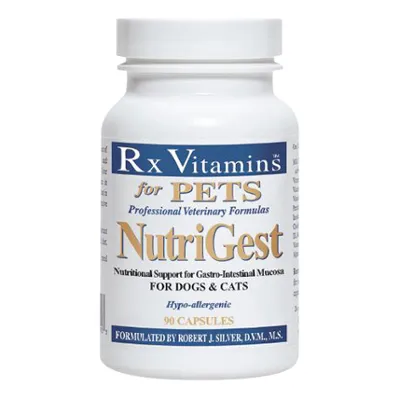
What it is: A specialized nutritional supplement capsule containing a blend of probiotics, glutamine, and soothing botanical ingredients like aloe.
How it works: This multi-faceted supplement aims to restore beneficial gut bacteria (probiotics), support the repair of intestinal lining cells (glutamine, an amino acid), and reduce inflammation and irritation in the gut (aloe).
When it’s prescribed: For managing various forms of diarrhea, especially those involving inflammation or damage to the intestinal lining, and to promote overall gut health recovery.
Administration: Typically given two to three times daily, based on your dog’s body weight, as instructed by your veterinarian.
Navigating the Choice: Why Vet Consultation is Paramount

Choosing the best approach for your dog’s diarrhea, especially when considering a dog anti-diarrhea medication prescription, always requires professional veterinary guidance. Your vet is the only one who can accurately diagnose the cause and recommend the most appropriate and safe treatment plan. This process often involves:
- Thorough Examination: A physical check-up to assess your dog’s overall health and hydration status.
- Diagnostic Tests: Depending on the symptoms, your vet may recommend stool samples (to check for parasites or bacteria), blood tests (to rule out systemic illnesses or evaluate organ function), or even imaging (X-rays, ultrasound) to investigate internal issues.
- Factor Consideration: Your vet will consider the:
- Cause: Is it dietary indiscretion, parasites, bacterial infection, stress, or a more serious underlying condition?
- Severity and Duration: How acute or chronic is the diarrhea?
- Additional Symptoms: Are there other signs like vomiting, lethargy, or pain? If your dog is experiencing skin issues that require anti itch meds for dogs, or is on other medications like Rimadyl dog medicine, this could influence the chosen anti-diarrhea treatment.
- Age and Overall Health: Puppies, senior dogs, or those with pre-existing conditions (e.g., kidney disease, diabetes) require a more cautious approach.
- Tailored Treatment Plan: Based on all gathered information, your vet will recommend a specific plan, which may include dietary changes, a prescription medication, or supportive care.
Remember, treating your dog’s diarrhea might involve some trial and error, especially if the cause is initially unclear. Continuous communication with your vet and diligent monitoring of your dog’s symptoms are vital to ensure the treatment plan is adjusted as needed for the best possible outcome. This also applies to other health concerns, such as deciding if a dog vomiting tablet is appropriate or if a preventative measure like flea tick meds for dogs is overdue.
Essential Tips for Managing Dog Diarrhea with Prescription Meds
Successfully treating your dog’s diarrhea, particularly with prescription medication, requires a proactive and diligent approach. Here are some essential tips to help your dog recover quickly and effectively:
- Do Not Delay Treatment: As soon as you notice persistent or severe diarrhea, contact your veterinarian. Early intervention can prevent dehydration and more serious complications, often leading to a faster recovery.
- Strictly Follow Your Vet’s Instructions: Whether it’s a specific dog anti-diarrhea medication prescription or dietary advice, adhere precisely to your veterinarian’s instructions regarding dosage, frequency, and duration. Do not stop medication early, even if symptoms improve, unless advised by your vet.
- Monitor Your Dog Closely: Pay attention to changes in stool consistency, frequency, and any new or worsening symptoms. Report any concerns to your vet promptly. This continuous observation helps your vet adjust the treatment plan if necessary.
- Ensure Adequate Hydration: Diarrhea causes significant fluid loss. Always ensure your dog has access to fresh, clean water. If your dog is reluctant to drink, your vet might suggest oral rehydration solutions or, in severe cases, intravenous fluids.
- Implement a Bland Diet: Often recommended alongside medication, a temporary bland diet (e.g., boiled plain chicken and white rice, or prescription gastrointestinal diets) can help soothe the digestive system and promote healing. Introduce food slowly and in small portions as your dog recovers.
Frequently Asked Questions About Prescription Diarrhea Meds for Dogs

When your dog is unwell, it’s natural to have many questions. Here are answers to some common concerns about canine diarrhea and its prescribed treatments.
How long is too long for a dog to have diarrhea?
Most mild cases of dog diarrhea, often due to dietary indiscretion or stress, resolve within 1 to 2 days with supportive care. If your dog’s diarrhea persists beyond 48 hours, or if it is severe, accompanied by other symptoms, or affects a puppy, senior, or immunocompromised dog, you should contact your vet immediately.
What should I give a dog with diarrhea and vomiting?
Dogs experiencing both diarrhea and vomiting are at high risk for dehydration. The absolute priority is hydration. Ensure constant access to fresh water. Your vet might recommend withholding food for 12-24 hours to rest the digestive system. Do not give human medications. Your vet will likely prescribe specific medications to address vomiting and may recommend oral rehydration solutions or intravenous fluids.
Is it safe to give human medications to dogs with diarrhea?
Generally, no. Human anti-diarrheal medications, like Imodium or Pepto-Bismol, contain active ingredients that can be toxic or harmful to dogs, cause severe side effects, or interact negatively with other medications. Always consult your veterinarian before giving your dog any medication, human or otherwise.
What are the potential side effects of prescription anti-diarrhea drugs for dogs?
Side effects vary by medication. For example, antibiotics like Metronidazole can cause nausea, appetite loss, or neurological symptoms in rare cases. Adsorbents are generally very safe with minimal side effects. Probiotics typically have no adverse effects. Your veterinarian will discuss specific side effects associated with any prescribed medication and advise you on what to watch for.
Can a bland diet replace a prescription medication for diarrhea?
A bland diet is an excellent supportive measure for dog diarrhea, often helping to soothe the gut and firm stools. However, it cannot replace a prescription medication if the diarrhea is caused by an underlying infection (bacterial, parasitic), severe inflammation, or other serious conditions that require targeted medical intervention. A bland diet works best when combined with appropriate veterinary diagnosis and treatment, which may include a dog anti-diarrhea medication prescription.
Conclusion
Canine diarrhea, while common, is never something to take lightly. Understanding the signs, knowing when to seek veterinary help, and recognizing the role of a dog anti-diarrhea medication prescription are paramount for your pet’s well-being. Whether it’s a bacterial infection, parasitic invasion, or severe inflammation, your veterinarian is your most trusted partner in diagnosing the cause and prescribing the most effective, safe treatment. By prioritizing professional medical advice and diligently following treatment plans, you can help your beloved dog recover swiftly and return to their happy, healthy self. Always consult your vet for tailored advice and care.
References
- American Veterinary Medical Association (AVMA). (n.d.). Gastrointestinal Disease.
- Plumb, D. C. (2018). Plumb’s Veterinary Drug Handbook (9th ed.). Wiley.
- Veterinary Partner. (n.d.). Diarrhea in Dogs. Retrieved from https://veterinarypartner.vin.com/default.aspx?pid=19239&id=4951475
